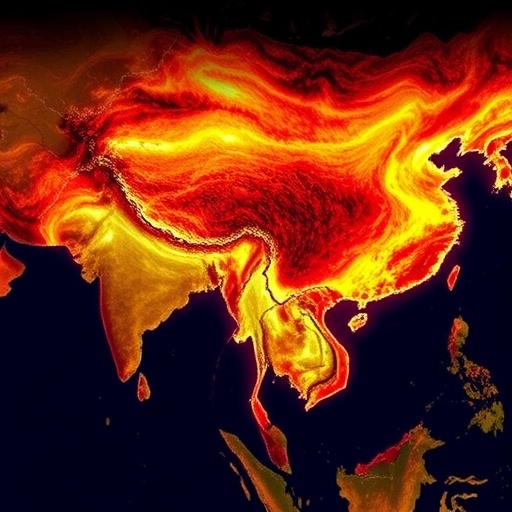Amidst the escalating global discourse on climate change, a groundbreaking study published in Environmental Science and Pollution Research is shining a spotlight on the specific challenges faced by Asia, a region that stands at the frontline of environmental degradation. The research, led by Punchihewa and colleagues, delves deep into the intricate dynamics between carbon dioxide and methane emissions and their subsequent impact on regional temperatures and sea levels. As one of the fastest-growing areas economically, Asia’s rapid industrialization and urbanization have significant implications for global climate. This study elucidates the profound relationship between rising emissions and their tangible effects on the climate.
The researchers highlight that carbon dioxide, a long-lasting greenhouse gas, primarily results from the burning of fossil fuels and deforestation. In contrast, methane, which has a much shorter atmospheric lifespan but is significantly more potent, often stems from agricultural practices, landfills, and livestock production. The distinct characteristics of these gases necessitate targeted strategies to mitigate their impacts, emphasizing the importance of research in understanding their regional implications, particularly in Asia. The study meticulously quantifies the emissions and discusses their trajectories, linking them prominently to behavior patterns in economic and urban growth.
Moreover, the study articulates how both gases contribute to the greenhouse effect, leading to global warming, but also underscores the regional variances in their impacts. Essentially, while globally the temperature trends may seem uniform, local conditions in Asia exacerbate the effects of climate change, such as increased flooding, droughts, and extreme weather events. This localized perspective is critical, considering that Asia is home to a significant portion of the world’s population; thus, climate-induced changes have far-reaching implications for human health and livelihood.
An initial focus on temperature shifts reveals alarming trends in the study. The authors point out that Asia has experienced temperature increases exceeding the global average. This is attributed to a combination of factors, including urban heat islands created by rapid urbanization, which disproportionately affects those living in cities. The urban environments trap heat, leading to increased energy demands for cooling, further exacerbating emissions. The implications of such temperature rise are dire, predicting adverse effects on agricultural productivity, water resources, and human health.
The research further underscores the concerning rise in sea levels—another critical area of focus for the researchers. Using predictive models, they estimate that the melting polar ice caps and thermal expansion of seawater will lead to significant sea level rise that could inundate coastal cities across Asia. The study emphasizes the fact that millions of people living in low-lying regions, such as Bangladesh and Vietnam, are particularly vulnerable to the impending threat of rising waters. The economic ramifications are staggering, potentially displacing populations and resulting in humanitarian crises.
Mitigation policies form an essential part of the study, as the authors advocate for region-specific actions to combat these challenges. They suggest that reducing reliance on fossil fuels, coupled with investments in renewable energy sources and sustainable agricultural practices, can substantially lower emissions. Policy recommendations also include establishing tighter regulations on methane emissions, particularly from livestock and waste management. These measures, if implemented effectively, could alter the trajectory of emissions and serve as crucial steps toward climate adaptation.
Additionally, the study calls for the proactive implementation of climate adaptation strategies. Adaptation, they argue, is as critical as mitigation. Enhancing infrastructure to withstand extreme weather, improving water management systems, and incentivizing sustainable agricultural practices are just a few strategies that Asia could employ to adapt to increasing climate challenges. Moreover, the involvement of local communities in adaptation planning is paramount to ensure that the solutions are not only effective but also equitable.
In recognizing the need for collaboration, the authors highlight the importance of international cooperation in addressing these regional issues. Climate change does not recognize national borders; thus, information sharing, technology transfer, and funding for sustainable initiatives across Asia are essential. Countries must work together to establish shared goals and strategies while also considering the unique socio-economic contexts of each region.
Furthermore, the researchers have pointed out the role of education and public awareness in combatting climate change. Increasing the understanding of the specific climate issues facing Asian populations can galvanize action at the community and national levels. They argue that an informed populace is crucial for advancing environmental policies and fostering a culture of sustainability. Grassroots movements have already proven effective in this regard, and greater support for such initiatives could enhance climate action across the continent.
Overall, the findings of this pivotal study serve as both a warning and a call to action. Asia, with its unique socio-economic landscape and environmental challenges, needs tailored solutions to combat the threat of climate change. The interplay between carbon dioxide and methane highlights the necessity for precise strategies that encompass reduction, adaptation, and international cooperation. The stakes are high, not just for the region, but for the global community, as the actions taken today will determine the trajectory of future generations.
In conclusion, as the urgent calls for climate action reverberate worldwide, this research stands as a crucial backstop, providing data-driven insights that can influence policy decisions and public understanding of the implications of emissions in Asia. With climate change continuing to gather momentum, it is imperative that effective responses are implemented swiftly, guided by the robust findings from Punchihewa et al.’s research. In navigating this critical juncture, collaboration, education, and innovation will be indispensable tools for enduring resilience and sustainability in the face of a changing climate.
Subject of Research: The effects of carbon dioxide and methane emissions on temperature and sea levels in Asia.
Article Title: Regional emissions and climate impact: analysing carbon dioxide and methane effects on temperature and sea levels in Asia.
Article References:
Punchihewa, C., Liyanage, S., Badurdeen, S. et al. Regional emissions and climate impact: analysing carbon dioxide and methane effects on temperature and sea levels in Asia.
Environ Sci Pollut Res (2025). https://doi.org/10.1007/s11356-025-37096-7
Image Credits: AI Generated
DOI: 10.1007/s11356-025-37096-7
Keywords: carbon dioxide, methane, climate change, Asia, temperature, sea levels, emissions, environmental impact.




